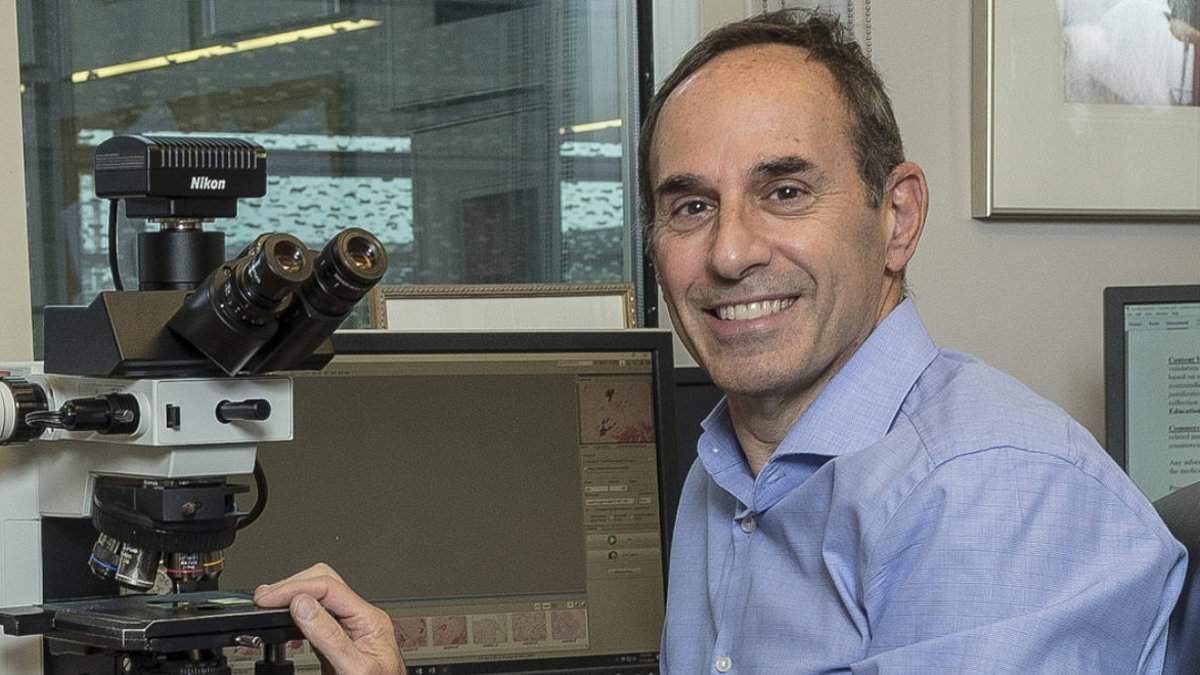A leading Johns Hopkins cancer surgeon has been suspended for months after an alleged misdiagnosis led to a patient having his bladder removed – and amid claims he bullied staff.
Eminent pathologist Jonathan I. Epstein, 66, is accused of giving second opinions that agreed with diagnoses made by his urologist wife, Hillary, 44, and pressuring other doctors at the world-renowned hospital to do the same.
In one case, following a double diagnosis by the couple, a man underwent a radical procedure to have his bladder removed on April 28 – only for post-op analysis to indicate a different diagnosis.
The allegations were included in a report by private hospital accreditation non-profit Joint Commission, seen by the Washington Post, which showed that Epstein was placed on administrative leave in May.
The report instructed Johns Hopkins Hospital to address persistent concerns about ‘a culture of bullying and intimidation in the surgical pathology department’ that placed patients at risk.
Eminent pathologist Jonathan I. Epstein, 66, is accused of giving second opinions which agreed with diagnoses made by his urologist wife Hillary, 44, and pressuring other doctors at the world-renowned Maryland hospital to do the same
Hillary Epstein practices at Chesapeake Urology Associates in Beltsville, Maryland, according to the organization’s website, after training at Johns Hopkins Hospital
It comes as analysis of US hospitals in recent years has shown that top-ranked institutions are not necessarily any safer for surgical procedures than any other hospitals.
Johns Hopkins Hospital has ranked in the top five of the nation’s best hospitals for the last 33 years, according to US News & World Report.
Epstein, who is ‘recognized as a leader in the field of urological pathology,’ according to the Baltimore hospital’s website, has said he was ‘profoundly distressed’ by the allegations in the commission’s report.
‘They are the antithesis of everything I stand for and have tried to exhibit in my professional life over these 35 years at Johns Hopkins,’ he told the Post in a written statement.
He declined to discuss the bladder removal case, citing patient privacy, but said medical cases have ‘many complicating factors.’
Epstein denied there was any conflict of interest inherent in the practice of him giving second opinions on reports made by his wife, who practices at Chesapeake Urology Associates in Beltsville, Maryland, according to the organization’s website.
‘As the expert in prostate and bladder pathology, I reviewed cases where there were disagreements between the [Hopkins] pathologists who did not have specialty training in prostate and bladder pathology and the [Chesapeake] pathologists (who were experts in the field),’ Epstein wrote to the Post.
Epstein said his diagnoses were ‘based solely on (his) objective evaluation of the case.’
Though it did not refer to Jonathan Epstein by name, the Joint Commission report also says several complaints have been made by other doctors against the ‘department leader.’
Investigators reviewed ‘multiple comments by pathology physicians and residents stating that they did not feel comfortable speaking up regarding “intimidation” or “bullying” behavior by a department leader.’
‘Johns Hopkins’ Pathology Department is nationally renowned, and we remain confident in the best-in-class services they provide,’ spokeswoman Liz Vandendriessche said in an email to the Post. (Pictured: the Baltimore hospital’s main building)
The medics indicated ‘that they were forced to change diagnoses, issue addendums and defer to the leader’s wishes over several years, thereby potentially leading to harm to patients’.
Physicians also said they ‘feared retaliation or career repercussions if they spoke up’, according to the report, which involved interviews with medics including physicians, residents, hospital leaders, and chief medical officers.
Jonathan Epstein claimed that when he worked with other doctors, they would show him difficult cases.
‘It has always been my impression that this discussion was collegial, professional, and undertaken in the interest of patient care,’ Epstein told the Post. ‘I have only requested cases to be amended when they were specifically sent to me for my opinion by patients, clinicians, and pathologists, and initially diagnosed by someone else in my absence. Upon my review, in a minority of cases I amended them so that patients would, based on my expertise, have the most accurate diagnosis leading to optimal therapy.’
Hillary Epstein did not comment on the allegations.
The Johns Hopkins Hospital said its reputation for world-class excellence would not be shaken by the report.
‘Johns Hopkins’ Pathology Department is nationally renowned, and we remain confident in the best-in-class services they provide,’ spokeswoman Liz Vandendriessche said in an email to the Post.
She added that the hospital is working with Joint Commission investigators to address the issues raised in the report.
‘Several of their citations have already been removed as a result of information we’ve provided,’ she said.
Scrutiny of hospitals is often done behind closed doors by private accreditation bodies, which rarely make reports public.
